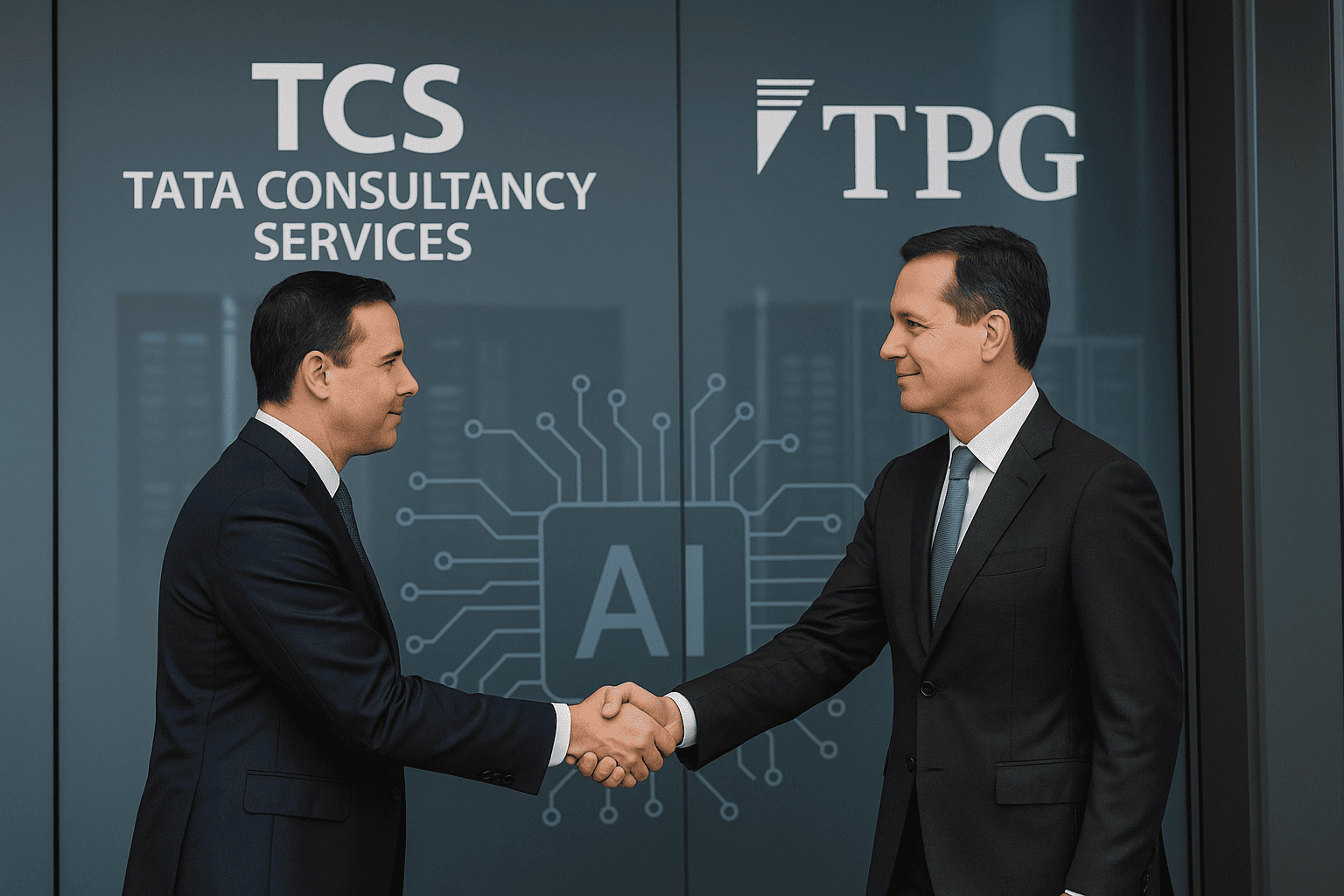TCS, TPG Plan $2B AI Joint Venture to Scale Enterprise Tools
By Tredu.com • 11/20/2025
Tredu

What is being proposed
TCS, TPG plan $2B AI joint venture to scale enterprise tools, according to reports that outline a structure pairing Tata Consultancy Services’ delivery network with TPG’s investment platform. The initiative would target packaged AI products and managed services for large clients, starting with horizontal capabilities such as copilots for software engineering, customer support, finance, supply chain, and security operations. While headline terms are subject to definitive agreements, the intent is to combine productized AI with TCS’s global integration skills and distribution.
Strategic rationale for both sides
For Tata Consultancy Services, the joint venture provides an avenue to move beyond time-and-materials projects toward recurring revenue tied to software and outcomes. TCS can seed the pipeline with reference deployments across banking, telecom, manufacturing, energy, and retail, then standardize modules into repeatable offerings. For TPG, the appeal is exposure to enterprise AI with a scaled anchor tenant, a clear go-to-market through TCS, and optionality to acquire niche tools that plug into the platform. The $2B headline suggests room for staged capital calls as product traction is demonstrated.
What the venture could build first
Early waves are likely to focus on copilots for developers and agents for service desks, areas where productivity uplifts are measurable. A second wave could bundle forecasting, anomaly detection, and optimization engines for finance and supply chains, plus AI observability and governance layers that satisfy board-level controls. The platform would need connectors to major clouds, API gateways, vector databases, and policy engines, so that clients can deploy safely in regulated environments.
Commercial model and pricing contours
Customers increasingly ask for outcome-linked contracts, not just licenses. The venture can mix per-seat subscriptions for knowledge workers with usage-based pricing for API calls and inference, plus premium tiers that include guaranteed response times, model retraining windows, and private deployments. Longer deals might include credits for cloud and chip capacity reserved through partners, wrapped by TCS’s managed services for support and change management.
Data, safety, and compliance requirements
Enterprises will demand strict data controls. The stack should support private network paths, role-based access, audit trails, and options for on-prem or sovereign-cloud deployment. Model risk frameworks will need bias testing, red-team routines, and incident playbooks, tied to clear documentation for auditors. A governance board with independent advisors can help align development with sector rules in financial services, healthcare, and the public sector.
Build versus buy, and the M&A lever
A $2B pool allows a blend of internal R&D and targeted acquisitions. The joint venture could buy specialty firms in retrieval, multimodal search, testing, or domain-specific agents, then fold them into a unified product line. TPG’s diligence and integration playbooks can shorten the time from deal signing to ARR contribution. TCS can de-risk integration by piloting acquired capabilities inside marquee client accounts before wide release.
Competitive landscape
Global services firms and software providers are converging. Hyperscalers bundle AI features across productivity suites, while independent vendors specialize in vertical workflows. The edge for a TCS–TPG vehicle would be client intimacy and the ability to integrate across legacy systems, combined with capital that funds multi-year product roadmaps. To compete, the venture must ship opinionated products, not only frameworks, and must offer transparent pricing that does not spike with usage.
Talent, delivery, and partner ecosystem
Product success hinges on engineering leadership, design, and domain experts. The venture can recruit model engineers and product managers, then augment with TCS architects who know client estates. Partner programs with chip vendors, clouds, and foundation-model providers will secure capacity and reduce cost volatility. University pipelines in India, Europe, and the U.S. can feed applied-research internships that translate into features.
Financial optics and governance
The $2B headline can be structured in tranches, for example an initial commitment for platform build, followed by milestone-based infusions for scale-out. Revenue recognition will favor subscriptions, managed services, and support, which smooths seasonality relative to project work. A board with representation from TCS and TPG, plus independent oversight for risk and audit, will reassure enterprise buyers that product continuity and support extend across cycles.
Risks and mitigations
Key risks include model drift, cost of inference, and client hesitation around data residency. Technical mitigations include caching, compression, and hardware-aware inference to keep unit economics attractive. Commercial mitigations include proof-of-value pilots with tight scopes, reference architectures by industry, and outcome-based SLAs. Integration risk from acquisitions can be reduced through common telemetry, billing, and identity layers across all products.
Market implications
If executed well, the TCS, TPG in $2B AI joint venture for enterprise tools story could push peers to formalize similar vehicles, pairing capital with distribution. Software names that sell into enterprises may face stiffer competition on platform breadth, while chip and cloud providers could see steadier demand from a venture that pre-commits capacity for clients. For Indian IT services as a whole, the move signals a pivot toward higher-margin, product-led revenue that can compound across cycles.
Bottom line
A $2B AI joint venture between Tata Consultancy Services and TPG aims to turn services reach and private-equity discipline into productized enterprise tools at scale. If the partners deliver measurable productivity and controlled total cost of ownership, the model can shift TCS further into recurring software and managed outcomes, while giving TPG a defensible platform for AI deals and rollups.

How to Trade Like a Pro
Unlock the secrets of professional trading with our comprehensive guide. Discover proven strategies, risk management techniques, and market insights that will help you navigate the financial markets confidently and successfully.


